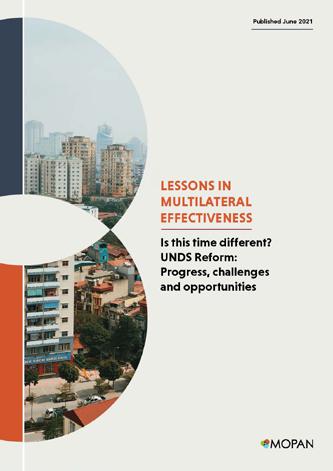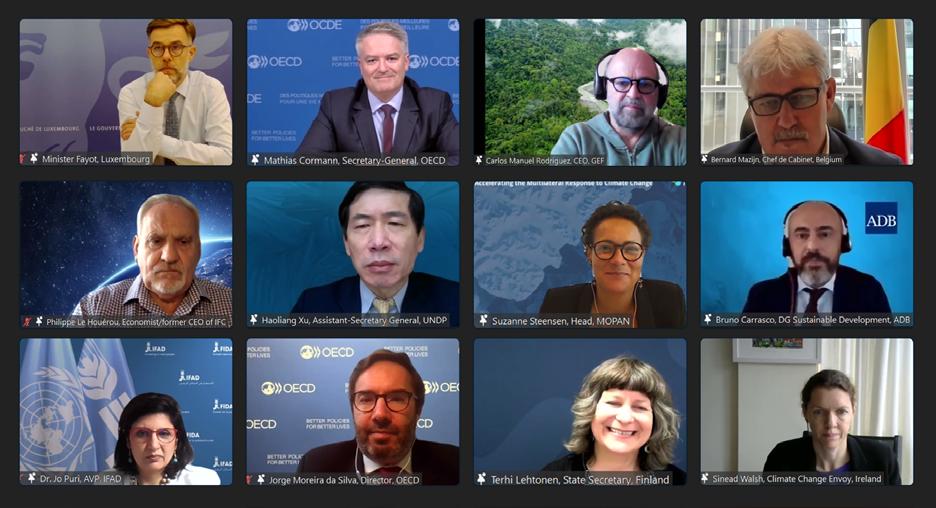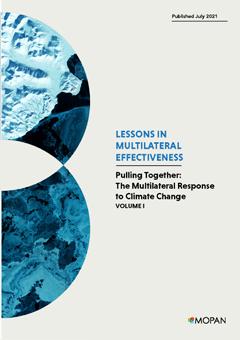
7 minute read
Key improvements to the Network in 2021
Lessons in Multilateral Effectiveness
In 2021, MOPAN launched its new study series, Lessons in Multilateral Effectiveness. Delivered in collaboration with various multilateral organisations, these analytical pieces explore the multilateral system’s response to salient challenges as climate change, the UNDS reforms and sexual exploitation and harassment. The findings support the dialogue between members and organisations on improving effectiveness in pertinent policy areas. By addressing cross-cutting themes in detail, the studies also strengthen MOPAN’s performance data by contributing to the ongoing evolution of its performance indicators.
Advertisement
Several events were organised in conjunction with the release of the studies to disseminate their lessons and convene relevant stakeholders. These included both member-only learning sessions and public events such as MOPAN’s first-ever, high-level event on climate change. Convened with the support of Luxembourg on 27 October 2021, on the eve of COP26, the event reflected on how to accelerate a cohesive multilateral response to climate action. Attended by over 300 officials including the heads of ministries and agencies, it featured a discussion among member climate envoys, senior development officials and climate and sustainability leads from multilateral organisations about how to strengthen the multilateral response in areas identified by MOPAN.
UNDS Reform: Progress, Challenges and Opportunities
MOPAN delivered its study on the progress of UNDS reform as UN member states convened to review the resident co-ordinator system, an area that the study explored deeply. The draft report was used heavily during discussions in the UN Economic and Social Council and during funding negotiations for the resident co-ordinator system. It was also cited several times in the Secretary-General’s review of the system and its funding.
The study offered crucial insights into the progress made on the reforms and persisting challenges thwarting their uptake. It identified potential areas for attention targeting the gamut of UNDS stakeholders, including MOPAN members (donor countries), partner countries, UN agencies, and the UN Secretariat. Lack of reliable funding and the inconsistent behaviour of countries and agencies were found to be risks to strong progress on the transition of the resident co-ordinator system from UNDP and to recognising its new invigorated, independent position. The study on UNDS reform was published in June with a launch event open to UN member states.
MOPAN conducted a three-volume climate change study analysing how 11 multilateral organisations address climate change within their mandates, strategies, operations and partnerships. The study looked broadly at country and regional work but also examined operations in selected countries in-depth, to illustrate the different adaptation and mitigation challenges countries face and to offer insights into country demand for climate action. The study was launched at MOPAN’s first high-level, virtual event co-hosted with Minister Franz Fayot and the Government of Luxembourg. Attendees included leaders of multilateral organisations and multilateral stakeholders — International Finance Corporation, Asian Development Bank, International Fund for Agricultural Development, Organisation for Economic Co-operation and Development, and the Global Environment Facility.

From left to right: Mr Franz Fayot (Minister of Economy and Minister for Development and Humanitarian Action, Luxembourg), Mr Mattias Corman (Secretary-General of the Organisation for Economic Co-operation and Development), Mr Carlos Manuel Rodriguez (CEO of the Global Environment Facility), Mr Bernard Mazijn (Director, Cabinet of the Minister for Climate, Belgium), Mr Philippe Le Houérou (Economist and former Chief Executive Officer, International Finance Corporation), Mr Haoliang Xu (Assistant-Secretary General, United Nations Development Programme), Ms Suzanne Steensen (Head of Multilateral Organisation Performance Assessment Network, Secretariat),Mr Bruno Carrasco (Director General of Sustainable Development and Climate Change, Asian Development Bank), Ms Jyotsna Puri (Associate Vice-President, International Fund for Agricultural Development) Mr Jorge Moreira da Silva (Director, Development Co-operation Directorate, Organisation for Economic Co-operation and Development), Ms Terhi Lehtonen (State Secretary, Ministry of the Environment, Finland), and Ms Sinead Walsh (Climate Change Envoy, Deputy Director-General, Department of Foreign Affairs, Ireland), at the MOPAN High-Level Event, Accelerating the Multilateral Response to Climate Change, livestreamed on the OECD COP26 virtual pavilion, Paris, 17 October, 2021. Photo: MOPAN The study confirmed that multilateral organisations are giving more importance to climate action in their strategies and operations. They are scaling up climate finance, including for adaptation, are largely committed to the Paris Agenda, are supporting countries in their commitments as expressed in nationally determined contributions, and are engaged in multiple international and regional partnerships. Notably, the report highlighted six major opportunities for accelerating the multilateral response to climate change, including to help the multilateral system further encourage greater “whole of government ownership” of nationally determined contributions, and help scale-up private investment to meet the Paris goals. The first volume of the study was published in early July, followed by the second and third volumes in October, ahead of COP26.

SEAH Note for Practitioners: Measuring Multilateral Performance
By adding SEA/SH indicators to its assessment methodology, MOPAN provided the first international joint benchmark in this area. The addition reflects recommendations from the OECD Development Assistance Committee’s “Recommendation on Ending Sexual Exploitation, Abuse, and Harassment in Development Co-operation and Humanitarian Assistance.” MOPAN’s indicator work was distinct in its formulation, as indicators were developed in collaboration with an external assessment commissioned by MOPAN members. Additionally, these indicators were applied to all organisations assessed by MOPAN, not just humanitarian organisations. The SEA/SH indicators added to the MOPAN assessment framework cover six main topical areas: i) policy, management and leadership; ii) prevention; iii) reporting and complaints; iv) response, accountability, and transparency; v) international co-ordination, and vi) putting victims/survivors first. MOPAN’s work on SEA/ SH prevention added two new indicators with a total of 16 elements influencing their assessment.
External evaluation of MOPAN
At the end of 2020, MOPAN members agreed to launch an independent, external evaluation of MOPAN covering 2015-21 to support the establishment of a new strategic vision.
The evaluation sought to identify how MOPAN can increase the utility of its products and generate more impact among a broader range of stakeholders within the multilateral system, including members and multilateral organisations. The strategy for conducting the evaluation was highly inclusive, including case studies with ten organisations and interviews and workshops with all MOPAN members and the Secretariat. The evaluation illustrated MOPAN’s gains in credibility, relevance, and utility, and highlighted important areas of improvement that will shape its future strategic direction.

Overall, the evaluation found that efforts to strengthen MOPAN since 2015, including by professionalising the MOPAN Secretariat, expanding coverage and strengthening the MOPAN methodology, had considerably increased the perceived quality, credibility and usefulness of assessments. Additionally, the evaluation highlighted the unique value of MOPAN’s emerging knowledge and analytical work in providing credible evidence about emerging accountability issues (e.g. SEA/SH), identifying common standards, and promoting uptake through communities of practice.
However, the evaluation also highlighted important challenges MOPAN will face in attempting to consolidate these gains and strengthen its impact. MOPAN’s framework and approach is primarily geared toward the needs of members and should also meet the needs of multilateral organisations if the Network wants to promote uptake, relevance, and use. Furthermore, MOPAN will need to expand the audience for its products beyond its membership to begin affecting change across the multilateral system, and truly serve as a knowledge broker within the multilateral system. Finally, opportunities exist to reconsider how and what MOPAN delivers to meet members’ needs while promoting cost effectiveness, including the use of new tools such as the MOPAN Data Platform.
MOPAN Data Platform
Phase 1
MOPAN first defined a vision of its data platform and set out an action plan for its delivery in 2021. It began a period of exploration and research in conjunction with Ernst & Young that provided a strong basis for reflecting on members’ data needs.
The primary iteration of the platform was launched in December 2021. It includes performance data from the last three MOPAN 3.0 cycles covering 31 assessed organisations. In addition to the scores at key performance indicator and micro-indicator levels, the platform gives members access to the analysis of those micro-indicators, the confidence levels for the evidence, and information on the scores and descriptors at the element level. Members can therefore easily identify the strengths and weaknesses of individual organisations and of the whole multilateral system.
Future phases of the MOPAN Data Platform will present key data, insights and evidence from MOPAN assessments, studies and relevant external sources in a user-friendly manner.
Phase 2
In 2022, MOPAN will establish its data platform as the go-to resource for performance data on multilateral organisations, exclusively for MOPAN members. As a repository for sharing good practices within the multilateral system, this platform will both help members better grasp the challenges affecting the multilateral system, and develop appropriate policies to enhance development impact. The platform is also expected to allow for greater comparison between the performance of multilateral organisations across selected areas.
Over time, the MOPAN Data Platform will incorporate MOPAN’s ongoing learning work produced in Lessons in Multilateral Effectiveness, including efforts to create dedicated sections on the cross-cutting theme of the prevention of SEA/SH.





